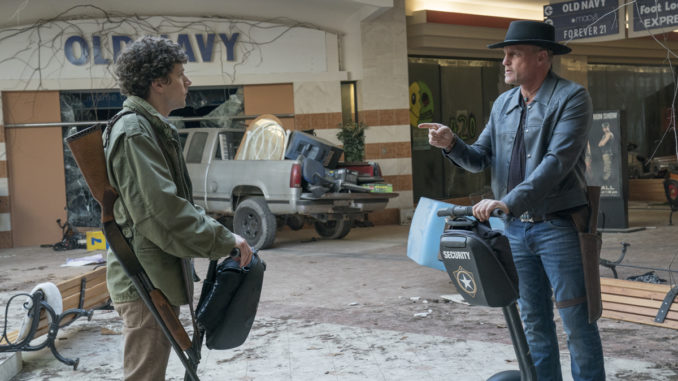
TMN film critic Gordon McPherson gives “Zombieland: Double Tap” 3/5 bloody guitars
Director Ruben Fleischer’s “Zombieland: Double Tap” fails to recapture the wit, stakes and heart of the original film, but nevertheless proves passably entertaining.
The original 2009 “Zombieland” was among the first R-rated films I ever watched — full of endearingly idiosyncratic characters and zombie bashing action.
The original solidified itself as a top-tier zombie film, proudly standing alongside “Shaun of the Dead” as a horror-comedy with real soul.
The main characters Columbus, Tallahassee, Wichita and Little Rock — played by Jesse Eisenberg, Woody Harrelson, Emma Stone and Abigail Breslin, respectively — were such an eclectic group of weirdos that I couldn’t wait to be reunited with them once again.
Fortunately, “Double Tap” brings back the same director and central cast as the original, with some new additions joining the fray.
Unfortunately, it doesn’t appear Fleischer cared about their character development over the past 10 years. The scariest aspect of “Double Tap” is how these characters become parodies of themselves. Zombies be damned — the writers are out to eat their brains.
The film takes place some unspecified number of years after the first— the teenaged Breslin has obviously aged a bit — but the film never clarifies this. Oh well, time is a social construct anyways. The dysfunctional crew is living in the White House, now overgrown with foliage and resembling a fraternity house.
Columbus — with his zombie survival rules galore — has become more brave, but also more irritating. Wichita hasn’t changed much at all, and she’s still prone to impulsive, nonsensical decisions. Tallahassee is now Little Rock’s obsessive surrogate father figure. Little Rock desperately wants to become independent and find romance in the apocalypse.
Suffice to say, while 10 years is a sizeable chunk of time, “Double Tap” refuses to age with the characters. Decisions are made throughout the film which defy logic considering the circumstances, and Tallahassee has unfortunately regressed even further into his gun-festishizing toxic masculinity — just with no mention of Twinkies this time around. Hostess Brands, Inc. needs to lighten up.
These characters, especially Wichita and Little Rock, are driven more by romance than by surviving in the zombie apocalypse. Wichita has virtually no agency of her own, and neither does Little Rock. When Little Rock chooses to abandon the group to be with a music-loving hippie named Berkeley — half-heartedly played by Avan Jogia — I couldn’t help but roll my eyes.
The new characters — Zoey Deutch’s dumb blonde Madison, Rosario Dawson’s Elvis-obsessed cowgirl Nevada and Thomas Middleditch and Luke Wilson’s quirky dopplegangers — all fit into caricatures that never develop into anything meaningful beyond one-note gags.
In fact, Madison has more scenes than Little Rock does, implying future character development which never happens.
Sure, it sounds like I really hated “Zombieland: Double Tap,” but, truth be told, I enjoyed myself. When the film makes callbacks to the original — including a couple outrageous mid and after-credits sequences — it succeeds in terms of comedy.
The rest of the jokes don’t fare quite as well. “Double Tap” overflows with raunchy humor that lacks intelligence and commentary, feeling dated in 2019.
Fleischer does know how to stage insanely gory action sequences, though. Indeed, these scenes of comical carnage are always impressive and occasionally hilarious. The small child sitting in front of me at the theater sure had a blast.
A fight scene midway through the film nearly recaptures the thrill of the Pacific Playland finale from the original.
Alas, the majority of these action sequences lack stakes. Any potential for tragedy or emotional thrill is tainted by the film’s reliance on comedy above all else.
Columbus’ introductory narration describes several new breeds of zombies that aren’t put to effective use later in the film. Why were they even mentioned to begin with?
Despite its numerous flaws, however, “Zombieland: Double Tap” remains perfectly watchable and amusing. One just wishes the filmmakers had put more effort into what really matters: revisiting old friends.
